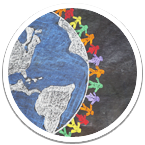Part 7: Recognising demographics as a part of anti-racist work
In part seven, Researcher Panu Artemjeff discusses the recognition of population groups as part of anti-racist work. Both individuals and communities have a need to be recognised.
By recognising the groups, we recognise the social struggle of minorities. The underlying issue is this: whose experiences of injustice are identified and recognised by the Finnish society? Do these individuals and communities feel like they are heard and that they get justice? The process of recognition is essentially linked to the measures we are willing to take to rectify the situation, so that these groups will feel like they can assert their rights, making the society a better place for all of us.
Materials supporting learning
See Panu Aftemjeff's slideshow (pdf 2,1 MB)
Key concepts:
- belonging
- norm
- racism
- racialisation
- universalism
- anti-racism
- normative whiteness
Read more about the key concepts.
Reflect on the following questions:
- What does recognition mean, and why is it an important part of anti-racist work?
- What kind of fields of recognition are there in our society?
- How are identification and recognition visible in our society in terms of individuals and communities?
- Which groups have experiences of inequality that are not identified or recognised?
- Who have you recognised in your own life?




